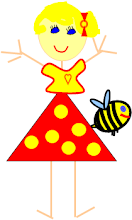A Mini-lesson focuses on skills preschoolers need to learn in managing everyday life skills.
Unlike a teachable-moment, a mini-lesson is planned out ahead of time. Like a teachable moment, the idea or topic of a mini-lesson often originates from an unexpected occurence that a teacher begins to notice or observe happening repeatedly in the classroom.
For example: Let's say that you observe your students throwing their paper towels on the floor after they wash their hands. You find yourself reminding your students everyday to throw the paper towels in the trash and not on the floor. If the problem continues to occur - then it is time for a mini-lesson.
A mini-lesson should be fun, light, age-appropriate, and educational. It is not a lecture. It is a creative way to teach young children what your expectations are and why. It is meant to help them learn a daily living skill. Do not assume that your student "should already know better."
- Mini-lessons are best when done in the form of a skit (usually one teacher is the child and another teacher is the adult).
- The teachers acts out a skit whereby the child is shown doing the desired behavior or action the wrong way first (make it dramatic and funny).
- The teacher then gives the child specific instructions as to how to correct the behavior or action.
- The child then does the desired behavior or action the correct way next (lots of praise and cheers).
- Mini-lessons should only cover one specific expectation at a time and should be very brief in length of time.
Teachers will often take time and creativity to teach a child how to print his name or count to ten but forget to apply that same amount of time and creativity towards teaching basic life skills.
Next time, when you find yourself repeating the same thing over and over again - consider a mini-lesson on the topic or issue at hand.
Be sure and Follow My Blog
What are the top five professional behaviors in preschool?
Copyright © 2009 Deborah J. Stewart; All Rights Reserved!


0 comments:
Post a Comment